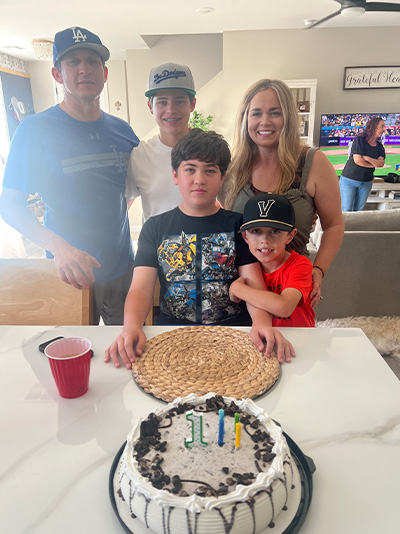As a parent, there are moments when you feel unprepared for the challenges that come your way. When I first learned that my son, Sam, had dyslexia, I was overwhelmed (even as an experienced special education teacher). However, my journey has transformed into one of hope, resilience, and a deeper understanding of this learning difference, including the hidden strengths of dyslexics. Today, I want to share my experience in the hopes that it might resonate with other parents navigating similar waters.
Understanding Dyslexia
Dyslexia is a specific learning disability that affects reading, writing, and spelling. It’s often misunderstood, with many people mistakenly believing that it’s simply a matter of “not trying hard enough.” For our family, understanding that dyslexia is a neurological condition that impacts how Sam processes language was crucial. It wasn’t about a lack of intelligence or effort; it was about how my child’s brain was wired.
The Diagnosis Journey
Our journey began with concerns about reading difficulties that became evident in first grade. The process of obtaining a diagnosis involved meetings with teachers, failed interventions, assessments, and the work of a very caring and thorough school psychologist. I remember feeling a mix of anxiety and relief when we finally had a clear answer. It was comforting to know that specific instructional approaches were proven to help, yet the reality of what this meant for Sam weighed heavily on my heart.

Emotional Impact
Learning about dyslexia was a double-edged sword. On one hand, I felt a sense of relief—at least we had a name for the struggles that Sam faced. On the other hand, I watched as Sam’s confidence took a hit, as dyslexia is so widely misunderstood, in and out of the classroom. Simple tasks like reading aloud in class became sources of anxiety, and I worried about the long-term impact on Sam’s self-esteem. As a parent, I realized the importance of open conversations. We talked about feelings, frustrations, and celebrated every small victory, reinforcing the idea that dyslexia was not a curse, but a blessing.
Highlighting Strengths
Children with dyslexia often possess remarkable strengths that can be overlooked in traditional educational settings. Many are highly creative thinkers, adept at visualizing concepts and solving problems in innovative ways. Their unique perspective allows them to approach challenges from angles that others might not consider, fostering out-of-the-box thinking. Additionally, dyslexic individuals frequently develop strong oral communication skills, as they learn to articulate their ideas effectively when reading and writing becomes a challenge. This ability to communicate well often translates into leadership qualities and resilience, making them adaptable in various situations. Understanding Sam’s strengths and being able to make him aware of these unique traits, positively influenced Sam and we saw a shift in his self-esteem.
Advocacy and Support
As I navigated the education system now as a parent, instead of an educator, I quickly became an advocate for Sam. This involved working closely with teachers, attending meetings, and understanding Sam’s rights. Some educators were incredibly supportive, while others struggled to understand dyslexia’s nuances. I learned to articulate my child’s needs clearly. You can view specifically what this looks like by viewing my recorded webinar, regarding teacher communication. For any parent in a similar situation, I recommend connecting with local support groups and educating yourself about Individualized Education Programs (IEPs). Knowledge is power.
Strategies for Success
It is essential for individuals with dyslexia to be enrolled in a structured literacy program and Sam proved this to be the biggest source of positive influence in his progression. We set aside dedicated time for reading together, incorporating multisensory approaches like phonics games and audio books. Technology also became our ally; apps designed for dyslexic learners transformed reading from a source of frustration to an engaging experience. I discovered resources that provided a wealth of information, including websites and books focused on dyslexia. My favorite book, The Dyslexic Advantage, changed my life not only as an educator, but as Sam’s Mom.
The Dyslexic Advantage
The Dyslexic Advantage by Brock Eide and Fernette Eide explores the unique strengths and abilities often found in individuals with dyslexia. The authors argue that dyslexia is not just a learning challenge but also a gift that can lead to exceptional skills in areas such as problem-solving, creativity, and spatial reasoning. Through a combination of personal anecdotes, scientific research, and practical insights, the book highlights how dyslexic thinkers can excel in fields like entrepreneurship, the arts, and technology. The Eides advocate for a shift in perspective—from focusing solely on the difficulties of dyslexia to embracing the advantages it can confer, encouraging parents, educators, and society to recognize and nurture these inherent talents.
 Celebrating Progress
Celebrating Progress
Despite the challenges, I’ve witnessed incredible growth in Sam. Whether it was finishing a book or mastering a new spelling strategy, we celebrated every milestone. I often remind myself that dyslexia may present challenges in certain areas, but it doesn’t diminish my Sam’s strengths. I encourage other parents to focus on celebrating their child’s unique journey and the incredible qualities they bring to the table.
Conclusion
As we continue on this journey, I am reminded of the importance of love, patience, and understanding. Dyslexia is a part of Sam’s life, and it makes up the best parts of him. For those of you facing similar challenges, remember that you are not alone. Embrace the journey, advocate fiercely, and celebrate
every success—big or small. Together, we can support one another in this beautiful yet complex journey of parenting.


 Celebrating Progress
Celebrating Progress